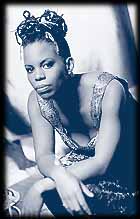
|
|
|
|
|
|
Photo Credit: Daryl Turner |
Regina Carter Regina Carter combines dazzling technique, exciting rhythm, and a gift for improvisation on an instrument that is sometimes under-recognized for its contribution to jazz: the violin. It is talent like Carterís which continues to bring this instrument closer to the forefront of jazz. Carter excels at variety of styles, including sultry ballads, R&B grooves, spicy Latin rhythms, and soulful swing. She claims that growing up in the ethnic diversity of Detroit gave her an awareness of diverse musical styles. On this program, Carter exhibits her versatility to an exuberant audience in the Terrace Theater at the Kennedy Center in Washington, DC. Carter started taking violin lessons at the age of four. She studied under the Suzuki method, through which young children are trained to play by ear before learning to read musical notation. Her teacher also encouraged improvisation by creating opportunities to make up melodies in key. The Suzuki method also uses clever phrasing to teach rhythm in a way that is more familiar to children. During the show, Carter and Dr. Taylor discuss some of the benefits of these unique training techniques. Carter never had heard jazz violin until she was sixteen, having primarily been exposed to classical and pop. Then someone turned her on to a record by Jean-Luc Ponty, who became her first jazz idol. When she attended the New England Conservatory of Music, she learned about other jazz violinists who would also inspire her, including Stuff Smith. After one year of majoring in both Jazz and European Classical, Carter decided to focus her studies exclusively on Jazz. She explains, "The music was just so free...It really touched me. I knew that was what I had to do. I had the calling." At Dr. Taylorís request, Carter knocks off a touching rendition of "Donít Explain", a song made popular by vocalist Billie Holiday. Dr. Taylor notes that Carterís rendition in effect re-composes a familiar tune into her own form of expression. He asks Carter where she finds her inspiration in songs, and the two discuss how jazz itself is an expression of personal experience. In the course of their conversation, Carter shares how she is drawn to rhythm when she composes music, despite the more melodic tendencies of her instrument. She says she often looks to Latin and Reggae for inspiration. With the Billy Taylor Trio, she cooks up a red-hot rhythmic rendition of a classic Latin hit, "Tiko, Tiko". Over the resounding applause, Dr. Taylor exclaims, "Oh yeah, sheís serious about that rhythm, isnít she!" In response to questions from the audience, Carter describes some of the obstacles the recording industry can impose on musiciansí creativity. She also offers insights on how to improvise a solo. Carter advises the audience, "There is no such thing as a wrong note, itís just where you put the note. And you just play it with conviction!" In her music, as well as in conversation, Carter truly comes across with conviction. The audience at the Kennedy Center surely would attest to that. Other numbers carried off with great conviction include: "There is No Greater Love", Duke Ellingtonís "Come Sunday", and "Listen Here" by Eddie Harris.
|
|
| |
